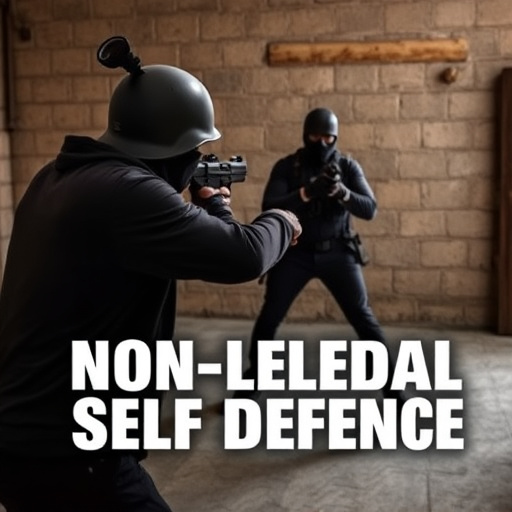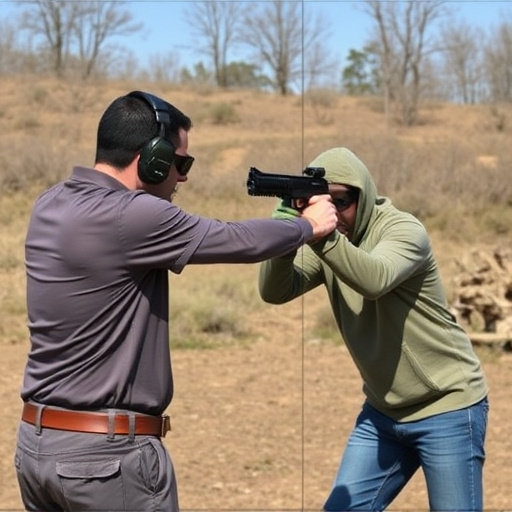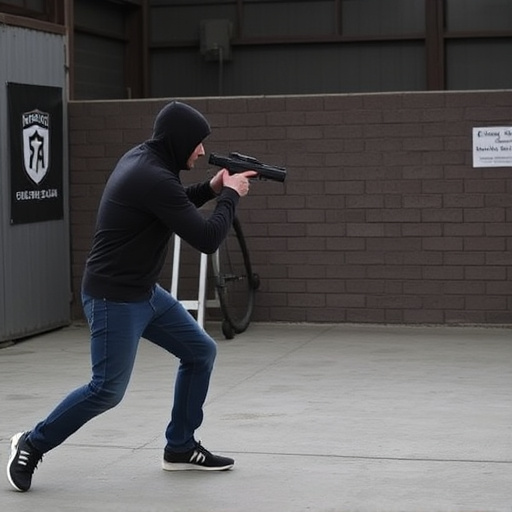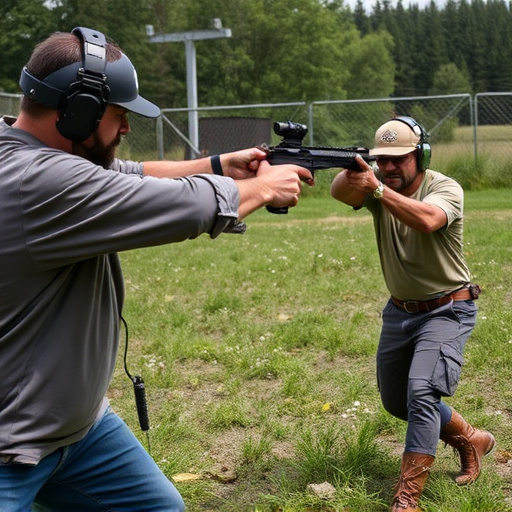Stun Gun Carrying Laws: State Requirements & Workplace Policies
Stun gun ownership in the US varies widely by state, with regulations impacting personal and workpla…….
Stun gun ownership in the US varies widely by state, with regulations impacting personal and workplace defense. Individuals must understand their state's laws regarding purchase, carry, and usage, as well as local ordinances and workplace policies. Navigating these requirements is essential to remain compliant and ensure safety, considering the evolving legal landscape and discussions around stun guns in the workplace for enhanced security.
In the United States, the regulation of stun guns, or Tasers, varies greatly from state to state. With growing interest in personal defense, understanding civilian Taser ownership requirements and state-specific laws is crucial. This comprehensive guide explores who can carry a Taser, where, and under what conditions. We delve into workplace policies regarding personal defense devices, legal implications, and real-world case studies. Additionally, we look at emerging trends in stun gun carrying regulations to keep citizens informed and safe.
- Understanding Stun Gun Laws: An Overview of Regulation
- Civilian Taser Ownership: Who Can Carry and Where?
- State-Specific Requirements for Stun Gun Purchase
- Workplace Policies on Personal Defense Devices
- Legal Implications and Case Studies
- Future Trends in Stun Gun Carrying Regulations
Understanding Stun Gun Laws: An Overview of Regulation

In many states, the regulation of stun guns, or tasers, falls under a broader category of less-lethal weapons. Understanding stun gun carrying laws is crucial for civilians considering ownership, as these regulations vary significantly from state to state. Some states allow open carry, while others restrict stun guns to concealed carry permits, with specific requirements for permit applications and background checks.
Workplace policies also play a significant role in stun gun ownership. Several states have incorporated provisions that prohibit the use of stun guns on certain individuals or in specific settings, including workplaces. Additionally, some employers may have their own strict policies regarding personal weapons on company property. Therefore, prospective stun gun owners must not only adhere to state laws but also familiarize themselves with local ordinances and workplace regulations to ensure compliance.
Civilian Taser Ownership: Who Can Carry and Where?

In many jurisdictions, civilians are allowed to own and carry stun guns, commonly known as Tasers, for self-defense purposes. However, the rules around civilian Taser ownership vary significantly from state to state in the US. Generally, individuals who meet certain criteria can legally carry a stun gun, but there are strict guidelines regarding where and how they can be used. Some states have relatively relaxed regulations, allowing qualified citizens to carry Tasers for personal protection without a permit. These laws often exempt stun guns from the typical firearm restrictions, making them more accessible than traditional firearms.
When it comes to the workplace, stun gun carrying laws can be particularly complex. Many employers have strict policies prohibiting any type of weapon on their premises, even if state law allows for civilian ownership. Some states have legislation that provides a level of protection for off-duty employees carrying a Taser, but this varies widely. Understanding both the state’s stun gun carrying laws and the specific workplace rules is essential to ensure compliance and maintain a safe environment for all.
State-Specific Requirements for Stun Gun Purchase

Each state in the US has its own set of regulations regarding the purchase and possession of stun guns, or taser devices. These laws vary widely, affecting who can buy a stun gun, where they can carry it, and under what circumstances. When considering stun gun carrying laws workplace safety should be at the forefront of your mind, as these rules are designed to protect both employees and employers.
In some states, anyone over a certain age can purchase a stun gun without a background check or waiting period. Other states restrict ownership to individuals with a valid concealed carry permit. Additionally, there might be restrictions on where you can carry a stun gun, such as prohibiting it in schools, government buildings, or places of worship. It’s crucial to understand your state’s specific requirements before attempting to purchase or carry a stun gun for personal or workplace defense.
Workplace Policies on Personal Defense Devices

Many workplaces have started to acknowledge the importance of allowing employees to carry personal defense devices, such as stun guns or tasers, for self-protection. However, there are strict guidelines and policies in place that govern their use and possession within the workplace. Stun gun carrying laws vary from state to state, so companies must comply with local regulations. Generally, workplaces require employees to obtain a permit or license to carry a stun gun, which involves meeting specific criteria related to background checks and training.
These policies often dictate that officers or security personnel are authorized to carry such devices, while non-security staff members may have restricted access. Some companies also implement rules about where and how these devices can be stored and used, ensuring the safety of employees and visitors. Understanding these workplace policies is crucial for individuals considering carrying a stun gun for protection while at work.
Legal Implications and Case Studies

The legal implications of civilian stun gun ownership vary significantly across state laws in the US. While some states allow individuals to carry stun guns openly or concealed with a permit, others have stringent restrictions or outright ban their possession. Non-compliance with these stun gun carrying laws can lead to severe legal consequences, including fines and imprisonment. Law enforcement agencies interpret and enforce these laws differently, adding another layer of complexity for civilians seeking to exercise their right to self-defense with stun guns.
Case studies offer valuable insights into the practical effects of stun gun ownership regulations. For instance, in states where open carry is permitted, incidents of stun guns accidentally discharged in public places have been documented, raising concerns about public safety. Conversely, strict laws limiting stun gun access may inadvertently hinder individuals from protecting themselves in high-risk situations, as demonstrated by various studies examining crime rates and victim outcomes. These real-world examples underscore the delicate balance between ensuring public safety and respecting constitutional rights to bear arms for self-defense, particularly in the context of stun gun carrying laws at the workplace or in public.
Future Trends in Stun Gun Carrying Regulations

As technology advances, so do the discussions around civilian stun gun carrying regulations. One notable trend is the increasing consideration of allowing stun guns in the workplace for enhanced personal safety. This shift is driven by advocacy groups and individuals who believe that providing employees with a means to defend themselves against threats can significantly improve workplace security. Many employers are already equipping their staff with basic self-defense training, and allowing stun guns as an additional tool could further bolster these efforts.
Furthermore, there’s a growing interest in making stun gun carrying laws more uniform across states. Currently, regulations vary widely, creating confusion and potential loopholes. Future developments might see harmonized standards to streamline the process for responsible citizens who wish to carry stun guns for personal protection. This could include standardized training requirements, background checks, and permitting systems, ensuring that all carriers meet a consistent level of responsibility and safety awareness.
The regulation of civilian stun gun ownership varies significantly across states, with each jurisdiction establishing its own requirements and restrictions. Understanding these state-specific laws is crucial for individuals considering carrying a stun gun for personal defense. While some states allow open carry with minimal licensing, others have stringent regulations, including mandatory training, background checks, and specific use cases. Navigating these laws is essential to ensure compliance and promote public safety in the workplace and beyond. As stun gun carrying continues to evolve, so do legal implications, underscoring the need for ongoing research and adaptation to changing trends in stun gun carrying regulations.


